Introduction
In the grand tapestry of technological advancement, Artificial Intelligence (AI) stands out as a dazzling thread, weaving its way through the fabric of our everyday lives. Yet, as we embrace this digital marvel, a question emerges from the shadows: How trustworthy is AI? This inquiry is not just a whisper among tech enthusiasts but a resonant echo across societal corridors. Through this article, we will explore the trustworthiness of AI in the US context, delving into its implications, benefits, and the complexities it introduces.
- Understanding AI Trustworthiness
- The Benefits of Trustworthy AI
- The Challenges and Risks
- AI in Various Industries
- Enhancing AI Trustworthiness
- Key Takeaways
- FAQs
- Conclusion
Understanding AI Trustworthiness
Imagine a world where machines think, learn, and make decisions—a realm where algorithms hold the key to unlocking infinite possibilities. However, with great power comes great responsibility. Trust in AI hinges on its ability to perform accurately, ethically, and transparently. It encompasses various aspects such as data privacy, algorithmic bias, and decision-making transparency. According to the National Institute of Standards and Technology, fostering public confidence in AI involves meticulous planning and regulation.
The Benefits of Trustworthy AI
The allure of AI lies in its potential to revolutionize industries—from healthcare to finance—enhancing efficiency and accuracy. A trustworthy AI system can lead to significant improvements in personalized medicine, predictive analytics, and customer service. For instance, AI-driven follow-ups can streamline sales processes by predicting customer needs effectively, as detailed in our article on AI-driven sales strategies.
The Challenges and Risks
However, the road to AI trustworthiness is strewn with challenges. Concerns about data misuse, algorithmic bias, and loss of jobs loom large. Notably, AI’s impact on employment has sparked debates about whether it will lead to the end of marketing jobs. Our exploration of this topic in the post on AI’s impact on marketing jobs provides valuable insights.
AI in Various Industries
From the bustling corridors of online retail to the serene offices of law firms, AI is reshaping how businesses operate. In the online retail industry, AI voice agents are making waves by enhancing customer interaction as explored in our piece on the impact of AI voice agents. These agents represent a blend of convenience and efficiency that could redefine customer service standards.
Enhancing AI Trustworthiness
To bolster AI’s credibility, stakeholders must adopt robust ethical frameworks and regulatory measures. The involvement of governmental bodies such as the Federal Communications Commission ensures that AI innovations adhere to established guidelines. Furthermore, transparency in algorithmic processes and community engagement plays a pivotal role in building trust.
Key Takeaways
- Trust in AI is crucial for its acceptance and integration into society.
- The benefits of AI include enhanced efficiency and personalized services.
- Challenges such as data privacy and job displacement need addressing.
- Effective regulation and transparency can enhance AI trustworthiness.
FAQs
What makes AI trustworthy?
Trustworthy AI performs tasks reliably while maintaining ethical standards and data privacy. Transparency and fairness in algorithms are essential components.
Is AI replacing traditional jobs?
While AI automates certain tasks, it also creates new opportunities. Its role in job displacement varies across industries and requires strategic workforce planning.
Conclusion
The journey to understanding AI’s trustworthiness is akin to navigating an uncharted sea—with every wave of advancement comes both promise and peril. As we sail forward into this digital era, it is imperative that we anchor our efforts in ethical practices and transparent processes. By doing so, we not only harness the benefits of this remarkable technology but also ensure that it serves humanity with integrity and respect.



